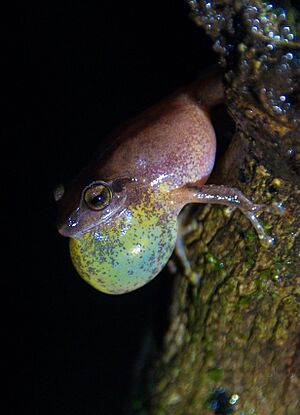Amboli bush frog facts for kids
Quick facts for kids Amboli bush frog |
|
|---|---|
 |
|
| Individual with inflated vocal sac in Amboli. | |
| Conservation status | |
| Scientific classification |
|
| Kingdom: | Animalia |
| Phylum: | Chordata |
| Class: | Amphibia |
| Order: | Anura |
| Family: | Rhacophoridae |
| Genus: | Pseudophilautus |
| Species: |
P. amboli
|
| Binomial name | |
| Pseudophilautus amboli (Biju and Bossuyt, 2009)
|
|
| Script error: The function "autoWithCaption" does not exist. | |
| Synonyms | |
|
Philautus amboli Biju and Bossuyt, 2009 |
|
Script error: No such module "Check for conflicting parameters".
The Amboli bush frog (scientific name: Pseudophilautus amboli) is a very rare type of shrub frog. It lives only in the Western Ghats mountain range in India. This special frog was first found in a place called Amboli. You can also find it in other parts of Maharashtra and Karnataka states.
Contents
About the Amboli Bush Frog
The Amboli bush frog is a small frog, but it's actually quite big compared to its closest relatives.
Size and Appearance
- Male frogs are about 3.4 centimeters long from their snout (nose) to their vent (bottom).
- Female frogs are a little bigger, reaching about 3.75 centimeters.
- When male frogs call out, they puff up a large, clear sac under their chin. This is called a vocal sack.
- Their body is quite strong and sturdy.
- The tips of their fingers have large, flat pads.
- The frog's eardrum, called the tympanum, is dark brown.
- Their back (called the dorsum) is a solid blackish-brown color.
- Their throat is a yellowish color with tiny black spots.
Where Amboli Bush Frogs Live
These frogs have been found in areas near evergreen forests in Amboli. These places were often changed by humans. We don't know if they also live deep inside untouched evergreen forests.
How They Reproduce
Amboli bush frogs reproduce through a process called direct development. This means that instead of laying eggs that hatch into tadpoles, the eggs hatch directly into tiny froglets. They skip the tadpole stage completely!
Protecting the Amboli Bush Frog
The biggest danger to the Amboli bush frog is losing its home. This happens when their natural living areas are destroyed or broken up. This is often due to cities growing and more tourism development.
Conservation Efforts
Currently, we don't know if these frogs live in any protected areas like national parks. Because of this, it's very important to protect their habitat right now. Saving their homes is the best way to help these rare frogs survive.
Gallery
 | John T. Biggers |
 | Thomas Blackshear |
 | Mark Bradford |
 | Beverly Buchanan |





